Products view allows user to create record of product’s (master) details and it’s accounts settings. User can also see price lists associated with the product, stock movement and usage.
Below actions are available under “Products”:
![]() View the list of products by Account Category, Brands and Market
View the list of products by Account Category, Brands and Market
![]() Create, revert and delete products.
Create, revert and delete products.
![]() Copy and close the product
Copy and close the product
![]() Import master product(s)
Import master product(s)
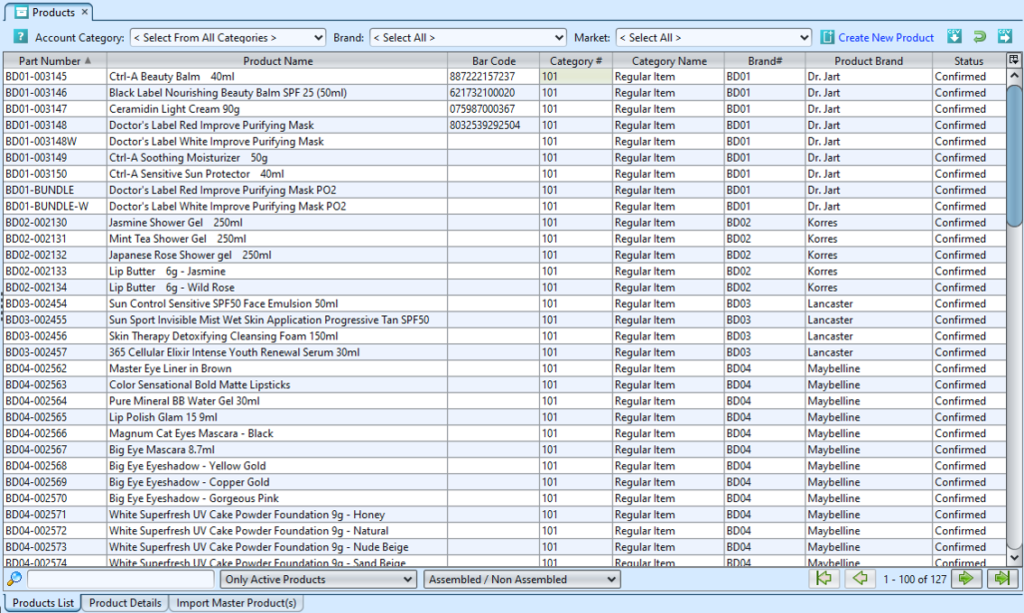
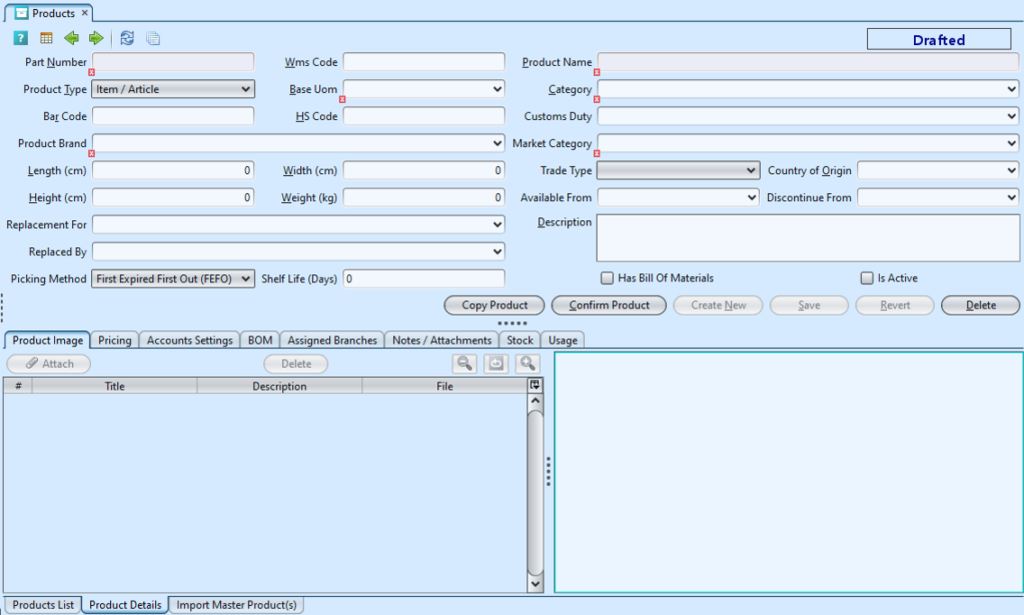
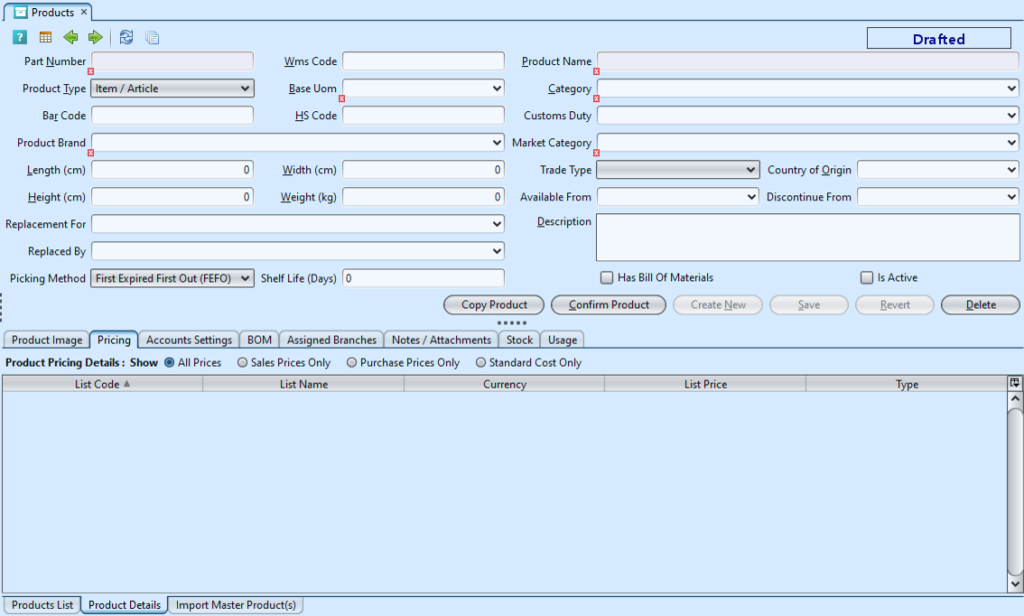
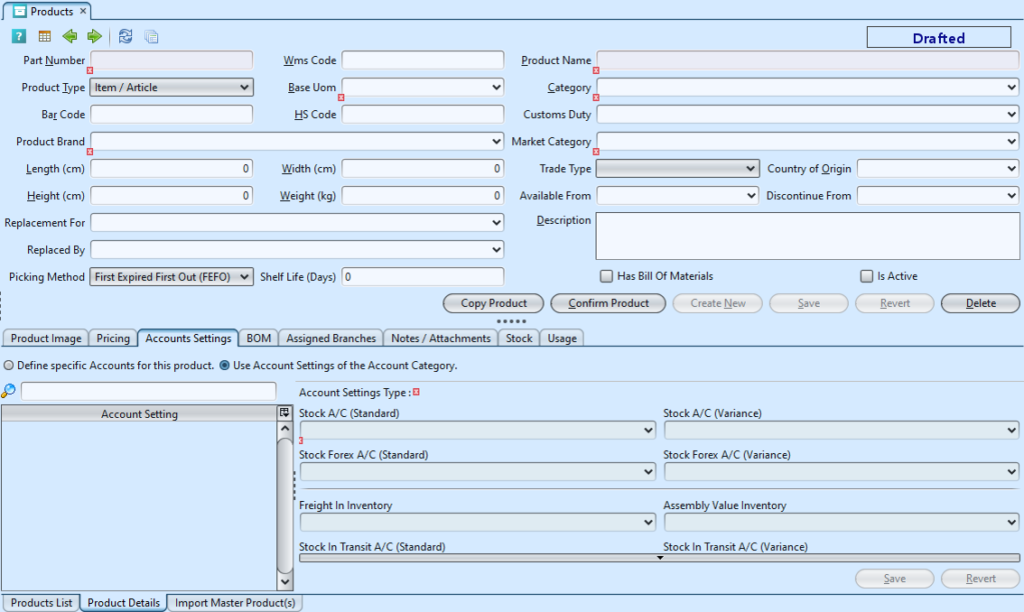
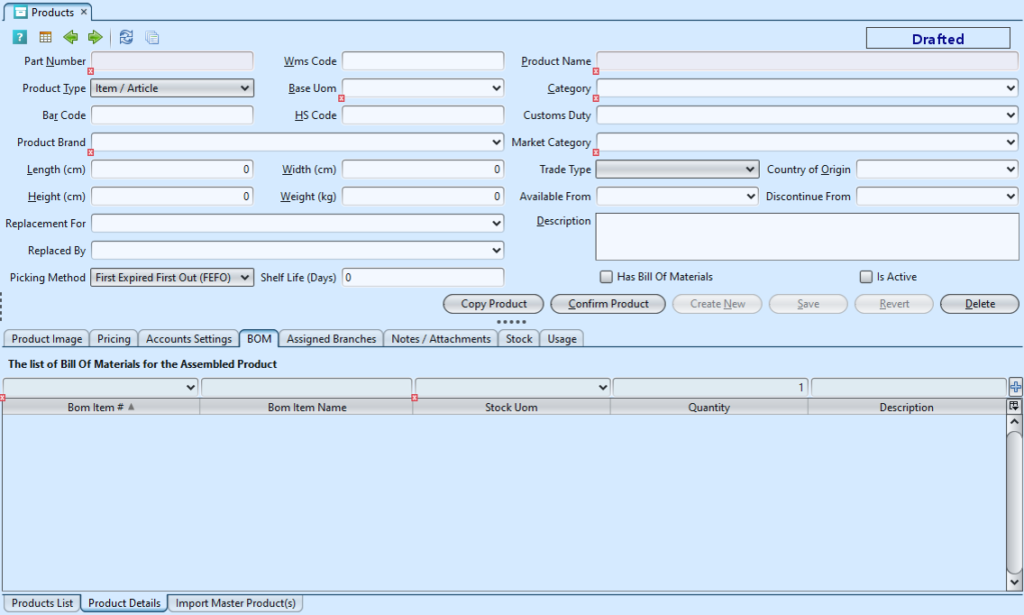
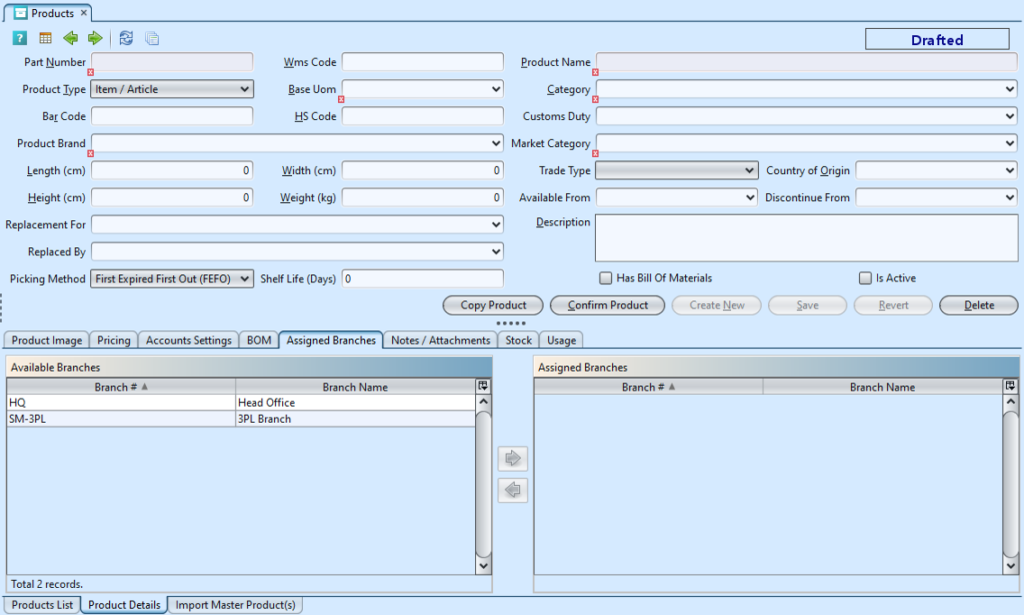
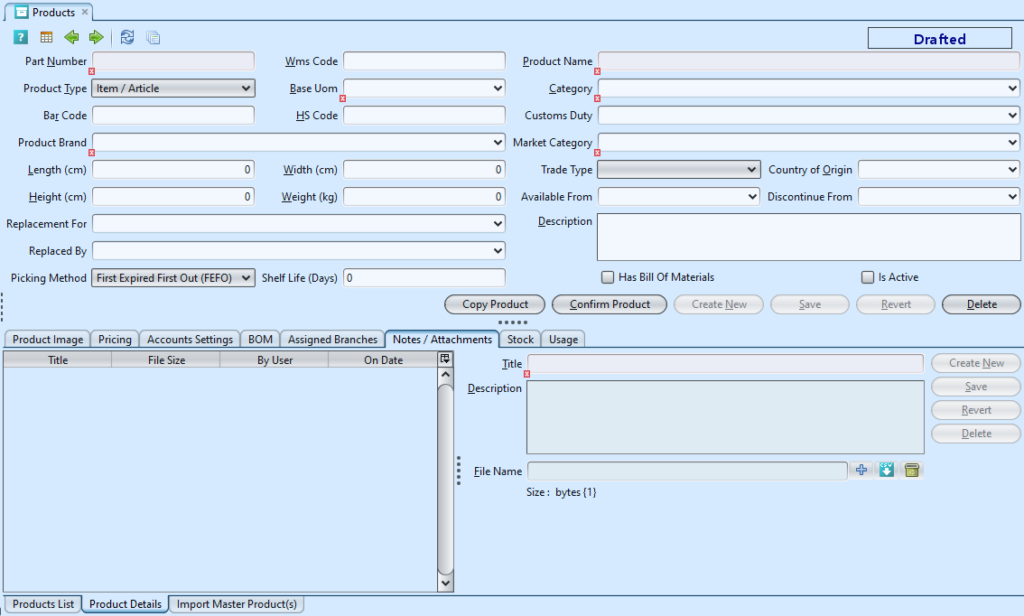
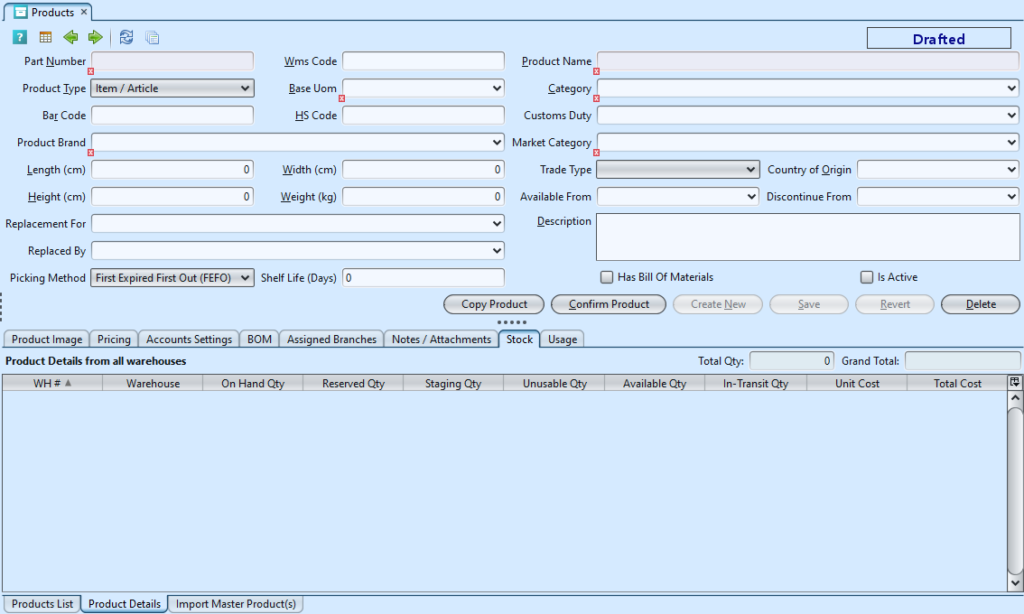
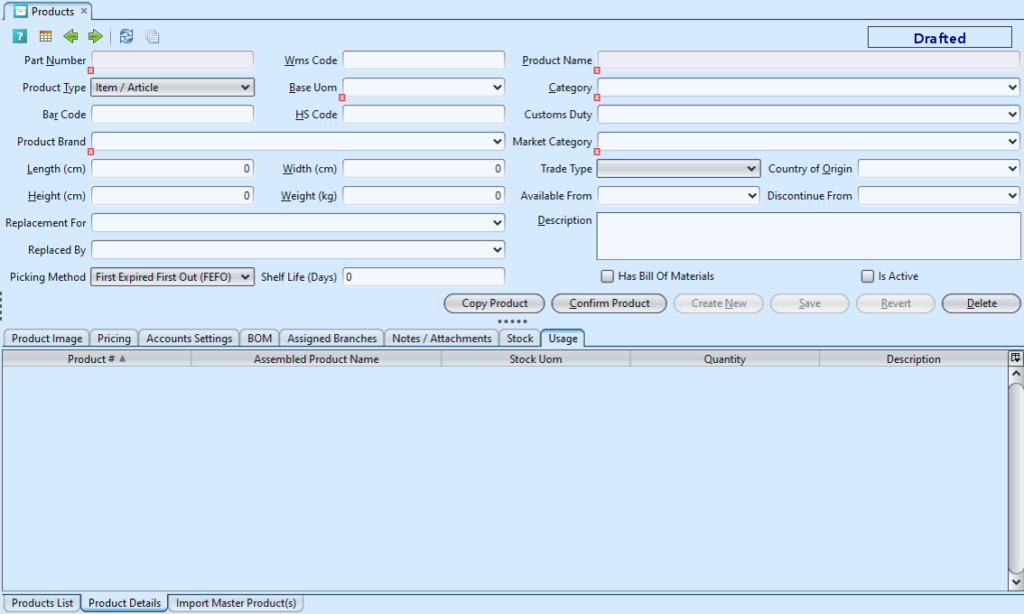
Field Name |
Description |
Mandatory Information |
| Part Number | Code that uniquely identifies the product |
Y |
| WMS Code |
N |
|
| Product Name | Name of the product |
Y |
| Product Type | Select the type of product:
|
Y |
| UOM | Type of the item – Unit of Measure |
Y |
| Category | Select the category of the product |
Y |
| Bar Code | Bar code number |
N |
| HS Code |
N |
|
| Customs Duty | Select the duty’s fees if there is any apply to the product |
N |
| Product Brand | Select the brand of product |
Y |
| Market Category | Select the market category |
N |
| Length (cm) | Self-explanatory |
N |
| Width (cm) | Self-explanatory |
N |
| Height (cm) | Self-explanatory |
N |
| Weight (kg) | Self-explanatory |
N |
| Trade Type | Sale, Purchase, or both |
N |
| Country of Origin | The country of manufacture or production where the product comes from. |
N |
| Available From | Start date of the product |
N |
| Discontinue From | End date of the product |
N |
| Replacement For | Self-explanatory |
N |
| Replaced By | Self-explanatory |
N |
| Description | Additional information for the product |
N |
| Picking Method | Select a Picking Method for the Product:
|
Y |
| Shelf Life (Days) | Shelf life of product in number of days. |
N |
| Has Bill of Materials | Tick the checkbox, if the item is a BOM |
N |
| Is Active |
Tick the checkbox, if the product is active in the system and in use. |
N |
Create New Product:
1. Click on “Create New Product” at the top right of screen of “Products List” tab, it will open “Product Details” tab with empty form

2. Fill up product’s information on the top half of screen. Fields in red color or marked with red x are mandatory information.

There are 3 product types:
- Item / Article: item type that may have both revenue and / or expense
- Service / Charge: service / charge rendered to customer / by vendor
- Made To Order: manufactured type of product, made order to be deliver to project customer (Samooha Project only)
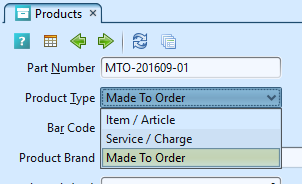
“Replacement For” and “Replaced By” are properties that are used only in the supply chain module. It will put the historical data for the products having “Replaced By” and combine it into the “Replacement For” product sales history. This will allow users to keep track of the historical performance of products when there is a product replacement (packaging, naming, etc…)
If product is assembled type, tick “Has Bill of Materials” checkbox. The “BOM” tab will then be available for user to enter the parts required to assemble this product.
“Picking Method” defines how the product inventory will be handled during sales batch reservation / logistics picking process. This will use the default picking method defined in the application, but user can select a different method. Enter value of “Shelf Life (Days)” of product in number of days. This value is use to auto calculate an expiry date of the product if users did not enter specific manufacturing date in transactions.
There are 3 types of “Picking Method“:
- First Expired First Out (FEFO)
- First In First Out (FIFO)
- Last In Last Out (LIFO)
3. Click “Save” button at the bottom right side of screen to save. Saving a product record with “Is Active” checkbox ticked will confirm the product. Alternatively click on “Confirm Product” button at the middle of the screen to confirm the item.

Note: User is able to copy an already created product to generate a similar new product record by clicking on “Copy Product” button. This will allow user to quickly create multiple products records for the same group / brand. Please note that “Part Number” must be unique.
4. User can add image(s) in the “Product Image” tab

Admin only – Location to store images usually was setup by admin. The settings can be found under “Organization (Settings) – Default Settings“.
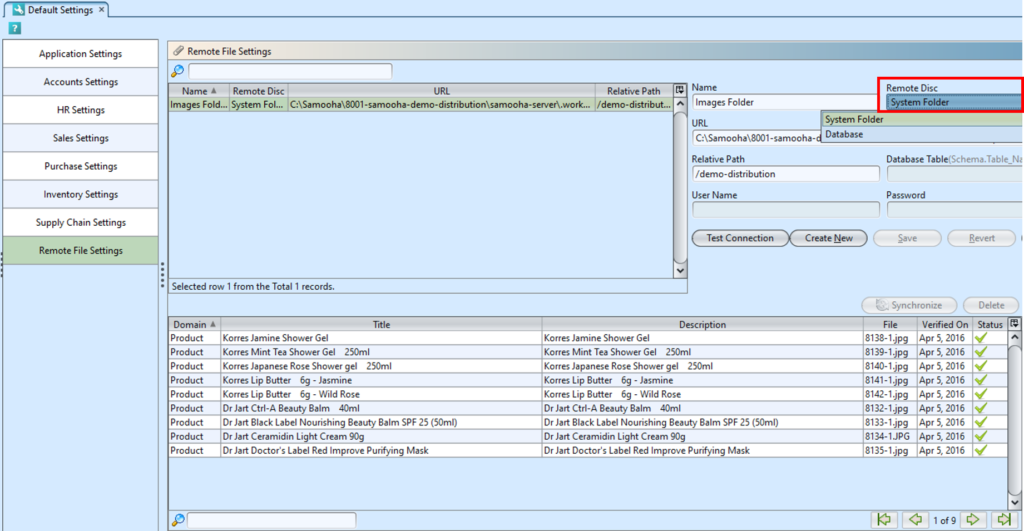
5. On “Pricing” tab, any price lists associated with the product will be automatically shown here when the price list was created, e.g. “Sales Price List“, “Purchase Price List”, etc.

6. Accounts settings for the product will be shown on “Account Setting” tab. These settings shows which accounts were used for postings of sales / purchase / inventory transactions of the product.

7. If the product is an assembled product type (“Has Bill of Materials” checkbox was ticked), “BOM” tab will be available for selection to add the BOM items (product’s parts). Enter the product’s (part) info and click ![]() button to add the product into the BOM list for product assembly.
button to add the product into the BOM list for product assembly.

8. On “Assigned Branches” tab, a default branch (e.g. HQ) has been automatically assigned for the new product. To assign another branch for the product, select available branch from the bottom left table and click ” ![]() ” button in middle of screen
” button in middle of screen

9. Click on “Notes / Attachments” tab at the middle of screen to add notes or files attachment for the product
10. On “Stock” tab, the stock’s availability in different warehouses and movement such as “Stock Transfer” will be updated automatically once there is any movement to the product’s inventory.

11. On “Usage” tab, the usage of the product will updated automatically if there is any usage for BOM / product assembly.

12. User can close or reopen a product record. Closed product record will be inactive and not available for selection in transactions. User is not allowed to edit product information when the product record is closed. Click on “Close” or “Reopen” button at middle of the screen in order to close or reopen the product.


Update Product Details:
1. On “Products List” tab double click on product to be updated, it will bring up the details on“Product Details” tab for the selected product.
2. Make change(s) on the product’s information
3. Click on “Save” button at the bottom of screen when done
4. Click on “Revert” button at the bottom of screen or refresh icon at the top of the screen to roll back the changes
5. In the products list view if you select a product (row) and right-click on the mouse, a menu will pop-up with options available for the selected product. To select multiple rows, hold Ctrl button and click on the rows to select.
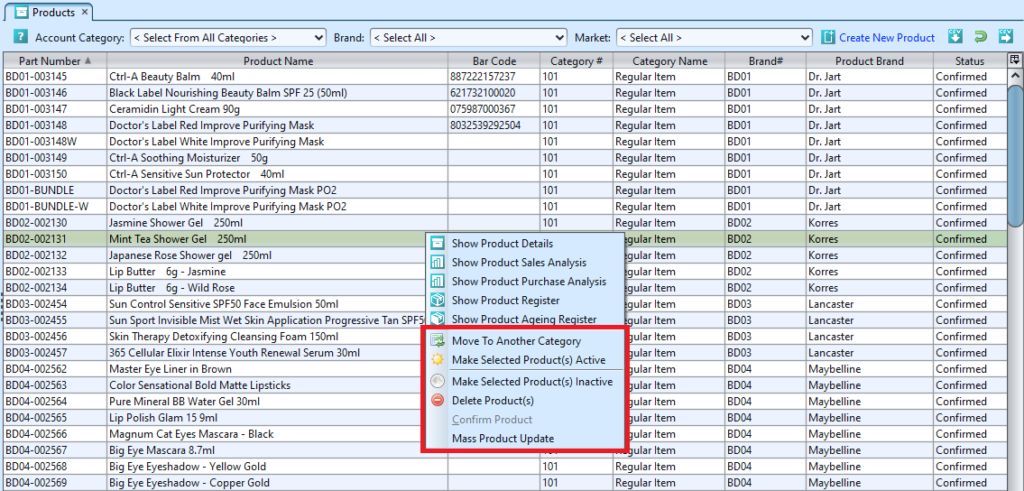
The users will have the following options to update the selected products:
![]() Make Selected Product(s) Active
Make Selected Product(s) Active
![]() Make Selected Product(s) Inactive
Make Selected Product(s) Inactive
![]() Confirm Product (if product status is drafted / not yet confirmed)
Confirm Product (if product status is drafted / not yet confirmed)
6. “Mass Product Update” feature allow user to update particular data field(s) of multiple product records. For example, update the “Product Brand” and / or “Country of Origin” of multiple products. Click “Update” button to apply the entered data updates.
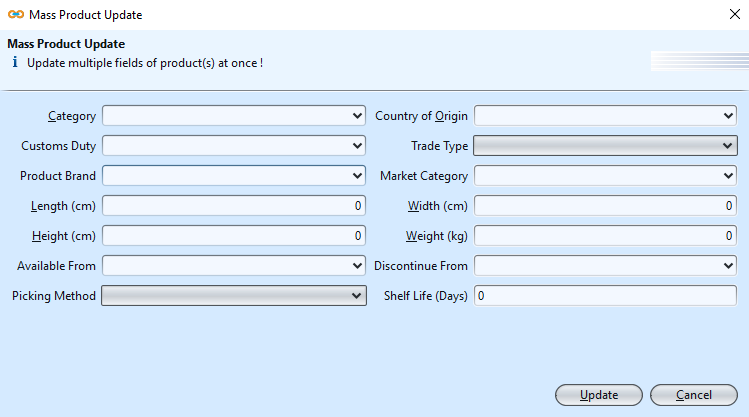
Delete Product:
1. On “Products List” tab double click on product to be deleted, it will bring up the details on“Product Details” tab for the selected product.
2. Click on “Delete” button at the bottom of screen
3. Click on “Yes” button on the pop-up window to confirm record deletion

View and Search for Product Details:
1. Click on “Product List” tab at the bottom of screen
2. Enter search parameter to filter the result, i.e. type in which product to search for in the“Product” text field box or select from drop-down list
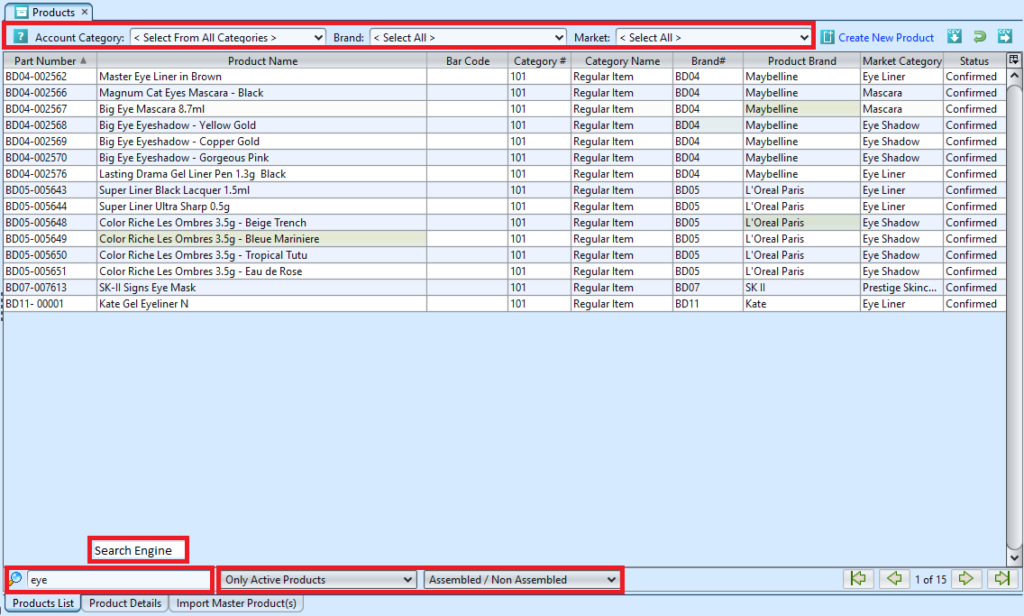
![]() Both Active / Inactive Products
Both Active / Inactive Products
![]() Assembled / Non Assembled Products
Assembled / Non Assembled Products
3. Result can be sorted alphabetically by clicking the fields’ columns
4. Double click on product to view full details of the product, it will bring up the details on “Product Details” tab for the selected product
5. In the products list view if you select a product (row) and right-click on the mouse, a menu will pop-up with options available for the selected product
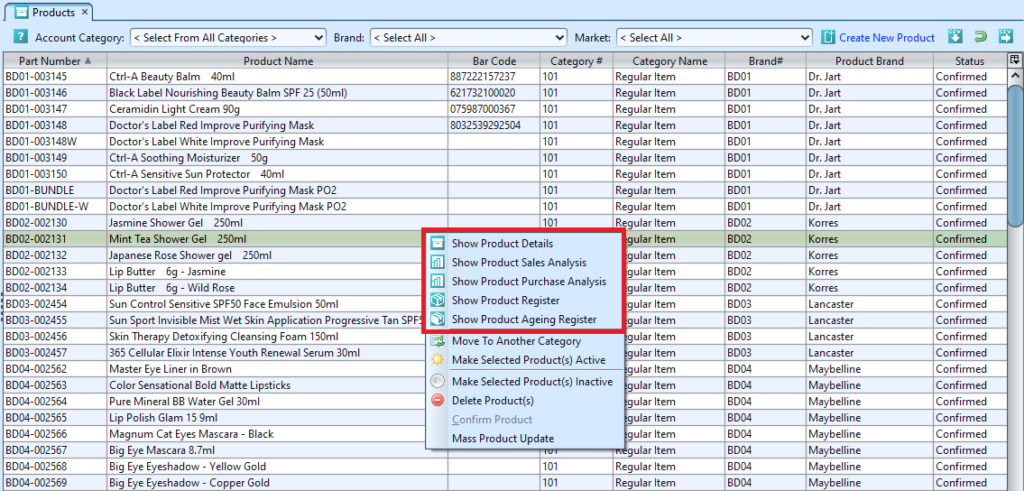
The users will have the following options to view further details on the selected product:
![]() Show Product Purchase Analysis
Show Product Purchase Analysis
![]() Show Product Register
Show Product Register


